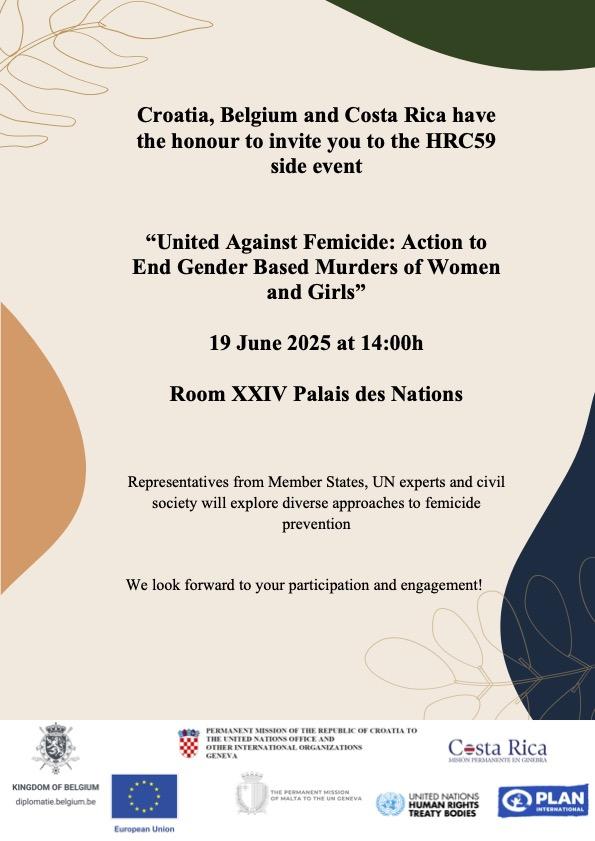United Against Femicide: Action to End Gender Based Murders of Women and Girls

Femicide, the intentional killing of women and girls because of their gender, is the most extreme manifestation of violence against women and girls, rooted in gender inequality, stereotyped gender roles, discrimination towards women and girls, and harmful social norms. Occurring in all regions and countries, femicide remains an urgent global crisis. The available data shows that globally, 85,000 women and girls were killed intentionally in 2023. Sixty per cent of these femicides –51,000- were committed by intimate partners or other family members. While the numbers presented are alarmingly high, the true scale of femicide is likely much higher.
Effective prevention of femicide requires a comprehensive approach through addressing root causes and societal norms, strengthening laws and policies specifically targeting violence against women and ensuring multi-sector collaboration. Several countries have made notable progress in addressing femicide through innovative policies and practices.
Belgium, Costa Rica and Croatia serve as illustrative examples, having implemented targeted legal frameworks, and monitoring mechanisms aimed at early intervention, gender-responsive policing, and access to survivor-centred support. These legislative developments reflect the states’ political will to fulfil their obligation to prevent, investigate, and punish gender-based violence against women and girls as well as to ensure restitution, reparations, or other remedies. They also represent positive practices highlighting the potential for meaningful change when governments, civil society, academia and international organizations collaborate to prevent femicide and ensure justice for victims.
Legislation is an important factor, which contributes in prevention by explicitly criminalizing the gender-based killing of women, establishing clear legal definitions, and ensuring accountability for perpetrators. This creates a legal framework that recognizes femicide as a distinct crime rooted in gender discrimination, which is essential for effective prevention and prosecution. Moreover, improved data collection enhances femicide prevention strategies through systematic tracking of cases to identify patterns, gaps in intervention and necessary policy improvements. Femicide Watch is one of the tools used for this purpose, that enables policymakers and practitioners to conduct targeted and effective prevention efforts.
Recognizing the urgency of this issue, the UN Special Rapporteur on violence against Women initiated the establishment of femicide watches in 2015 to enhance national-level femicide prevention. This was followed by CEDAW General Recommendation 35 (2017), which emphasized the need for data observatories on femicide. More recently, in 2023, the UN Statistical Commission endorsed a statistical framework for tracking and analysing femicide data to strengthen prevention strategies. Following the successful side event on the same topic held during the 69th session of the CSW in New York, this event will bring together representatives from Member States, UN experts and civil society to explore diverse approaches to preventing femicide including through legislative measures, data-driven interventions and national-level monitoring. By comparing different experiences, the discussion aims to identify effective strategies to prevent and adequately address gender-based murders of women and girls.
Guiding questions:
How does recognizing femicide as a distinct criminal offense contribute to raising awareness, prevention, and effective investigation of gender-based murders?
What legal pathways exist for introducing femicide into national legislation?
What are the key challenges in prevention and prosecution of femicide?
What are the benefits and limitations of establishing a Femicide Watch?
Why is the role of civil society important for effective integration of femicide into legislation?
Draft agenda:
1. Opening remarks: Mr. Gordan Markotić, Ambassador, Permanent Representative of Croatia
2. Panel Discussion moderated by H. E. Mr.Gordan Markotić
3. Speakers:
- Mr. Ivan Crnčec, State Secretary in the Ministry of Justice, Public Administration and Digital Transformation, Croatia
- H.E. Mr. Christian Guillermet Fernandez, Ambassador, Permanent Representative of Costa Rica o Ms. Nahla Haidar, Chair of the UN Committee on the Elimination of Discrimination against Women (CEDAW)
- Ms. Dubravka Šimonović, International Human Rights Expert, UN Special Rapporteur on violence against women (2015-2021) and CEDAW member and Chairperson (2003-2015)
- Ms. Tenar Lorente, UN Policy and Advocacy Advisor, Plan International Geneva
4. Closing remarks: H.E. Mr. Christophe Payot, Ambassador, Permanent Representative of the Kingdom of Belgium
5. Q&A Section
